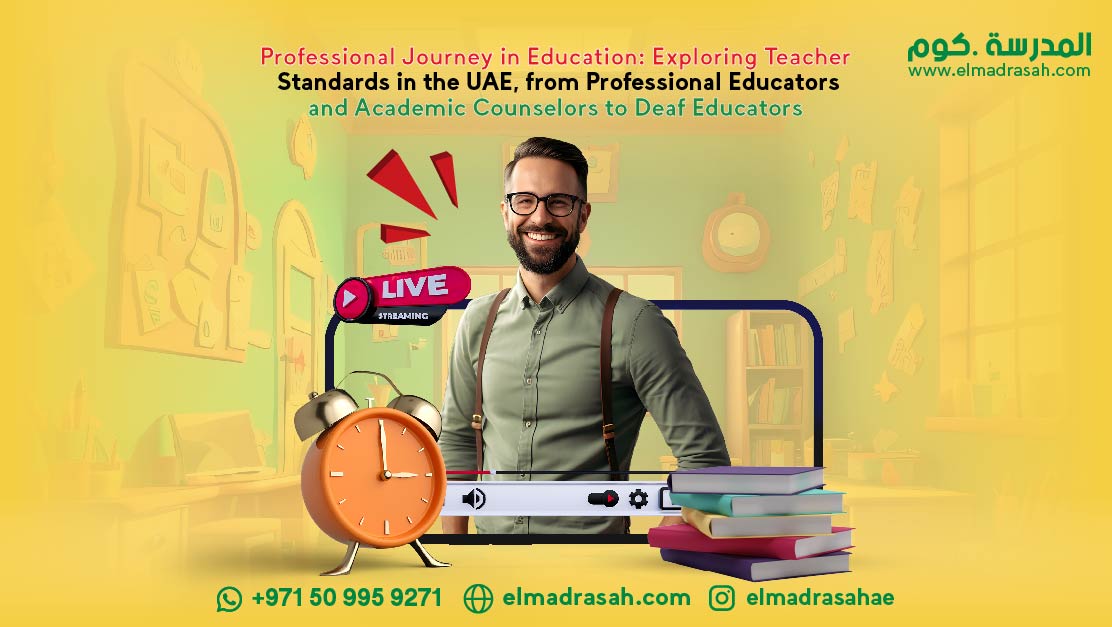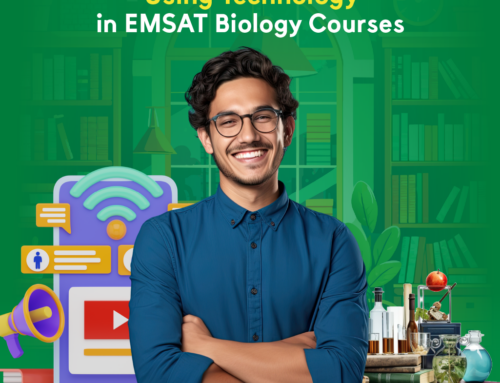
Education constitutes a vital foundation in building society and developing academic and social skills for rising generations. In the Emirates, the educational system is characterized by progress and innovation, as Professional Teacher adhere to high standards to achieve optimal performance, and the path of educational professionalism varies, starting from the vocational teacher and professional academic advisor, through science and mathematics teachers, to the teachers of the deaf who provide their services with great professionalism.
The professional teacher is the pillar of education
The professional teacher is considered the engine of the educational process, as he embodies the spirit of dedication and inspiration. He is committed to updating his knowledge and teaching techniques to meet the changing needs of students. The UAE supports the development of professional teachers through training programs and workshops that enhance their skills and introduce them to the latest educational innovations.
Among the most important standards of the United Arab Emirates for the Vocational Educator (TVET):
Standard 1: Professional and ethical behavior
Vocational education Professional Teachers demonstrate their commitment to the UAE’s heritage and cultural values. Personal and professional ethics, which are:
- Integrity, respect, justice and commitment.
- They collaborate and communicate professionally with stakeholders to promote and support learning.
- Compliance with legislative and regulatory requirements.
- Aligning planning and teaching with the educational vision and aspirations of the United Arab Emirates.
- Implement school policies and procedures that protect the physical, emotional, and psychological safety of learners.
Standard 2: Professional systems and compliance efficiency
TVET and VET practitioners understand and adhere to TVET standards and relevant legislation. The standards for a professional teacher include the following:
- They develop knowledge of key system stakeholders, Skills Advisory Councils (SACs), TVET regulatory authorities and licensing bodies.
- TVET practitioners source and use existing accredited qualifications, training products and resources.
- As part of the TVET process, TVET practitioners ensure that work practices comply with organizational policies and procedures and maintain accurate and up-to-date records.
- Stay up to date with information and best practice relating to vocational education and training within an educational context from the National Qualifications Authority (NQA) and other relevant awarding bodies.
- Contribute to the development of VET regulatory policies and appropriate terminology to use to communicate effectively within the sector and industry stakeholders.
Standard 3: Professional knowledge in teaching
The vocational and technical education Professional Teacher develops a deep and informed knowledge and understanding of theory and practice. They do the following:
- They maintain and update knowledge of their subject and/or professional field and knowledge of educational research to develop evidence-based practice.
- They apply theoretical understanding to effective practice in teaching, learning and assessment drawing on research and other evidence.
- TVET practitioners evaluate their practices with others and evaluate their impact on learning.
- TVET practitioners also manage and promote positive learner behavior.
- As part of being TVET professionals, they understand their educational and professional role and responsibilities.
Standard 4: Professional teaching practice
TVET practitioners develop expertise and skills to ensure the best outcomes for learners.
- They demonstrate awareness of basic educational theories and their applicability to the learning needs of individuals and groups.
- They also design resources and deliver effective educational programs for diverse groups that generate authentic learning experiences within inclusive environments.
- During facilitation, they use strategies and skills to ensure learners engage and achieve learning outcomes.
- TVET practitioners also motivate and inspire learners to enhance achievement to develop their skills and enable progress.
- They also contribute to program evaluation, and request regular feedback to evaluate their performance and plan improvements.
Standard 5: Competency assessment
The vocational and technical Professional Teacher demonstrates an understanding of assessment principles and rules of evidence.
- Contributes to the development of assessment tools, appropriate to the needs of the learner within a specific context.
- The TVET practitioner uses a range of methods to ensure the validity and reliability of assessment decisions and participate in assessment validation processes.
- Assess learners’ prior knowledge, learning needs, post-secondary goals, and career readiness.
- Collect and review information related to learners’ content knowledge; Previous learning experiences; and learning needs from school texts, questionnaires, and learner interviews.
- Promoting lifelong learning for learners to achieve their post-secondary education and career goals by providing access to advisors, advisors, or planning tools.
Standard 6: Industrial cooperation and professional growth
The Professional Teacher liaises with organizations to ensure that teaching and assessment reflects current industry practice and participates in networks of organizations to enhance their knowledge and skills.
- Maintains professional competence relevant to their subject area and to industry changes.
- Contextualizes program content and adapts teaching practices to suit the institution’s specific needs.
- The TVET practitioner reflects on what works best in teaching and learning to meet the diverse needs of learners by assessing and challenging their practices, values and beliefs.
- They also value and promote social and cultural diversity, equal opportunity and inclusion and build positive and collaborative relationships with colleagues and students.
- Collaborate with others to plan and implement improvements to your teaching and learning practices.
The professional academic advisor is the students’ compass towards success
The academic advisor provides comprehensive support to students, including academic counseling and career guidance. Upgrading academic advisors is vital to shaping students’ futures and directing them towards areas appropriate to their abilities and interests.
The standards for educational and Professional Teachers in the United Arab Emirates have been developed, reviewed and validated to ensure that specialists, at various career stages, are able to demonstrate professional competence that is consistent with the aspirations of the vision of the United Arab Emirates. Among the most important standards for professional teachers are the following:
Standard 1: Relationship with the client’s advisor
High-achieving school counselors adhere to the counseling process referred to as the client-counselor relationship which emphasizes the creation of a strong, emotional, and trusting relationship between the guidance counselor and the client/student. Her role:
- Foster and maintain a collaborative advisory relationship with the client.
- Exercise the ability to develop and maintain a counseling relationship with clients/students, throughout the counseling process.
- Provide responsive services through effective use of individual and group counseling, consultation and referral skills.
- Demonstrate effective system support by managing the school counseling program and other school educational and vocational programs.
- Cooperating and agreeing with school principals on the Guidance Department’s management system and implementing the program’s work plans.
Standard 2: Professional knowledge
High-achieving school counselors demonstrate a comprehensive understanding of established and emerging counseling theories. They possess a comprehensive knowledge of the techniques and processes that form the basis of effective school counseling with a diverse population and in relation to the needs of the school students involved. Among the professional teacher standards are the following:
- Demonstrate knowledge of the comprehensive educational and vocational system.
- Participate in planning and managing tasks to support the learning and development of learners.
- Knowledge of developmental and social psychology.
- Knowledge of basic theories of learning across the life course of human development.
- Exploration of the developmental period with particular emphasis on development in the early years and on adolescence.
- Identify the dimensions of human diversity and their potential effects on the development of children and adolescents.
Standard 3: Professional practice in the field of education, vocational and counseling
High-achieving school counselors apply a deep and broad understanding of a learner’s academic, vocational, and personal/social competencies. From helping individuals choose courses, develop educational plans, overcome learning disabilities, and prepare for post-secondary education, training, or entering the workforce. In addition to enhancing attitudes, beliefs and competencies that facilitate mastery of professional development tasks.
The professional teacher standards appear as follows:
- Develop knowledge and understanding of counseling within an educational context.
- Apply the knowledge and skills necessary to create and facilitate individual and group counseling.
- Planning, developing and organizing a comprehensive annual school educational and vocational guidance program.
- Implementing a guidance and counseling program that enhances the comprehensive development of learners.
Standard 4: Ethical conduct and practice
Educational, Professional, and Guidance Counselors serve as a guide to ethical practices for all school counselors, supervisors/directors of school counseling programs, and school counselor educators regardless of the level, district, and population served within a school.
The educational, vocational and counseling professional teacher standards are as follows:
- Apply ethical requirements when providing a comprehensive school guidance program.
- Respecting and promoting the values of the United Arab EmiratesRespect and promote the heritage and culture of the United Arab Emirates, including Islamic values and laws.
- Promoting and implementing the national educational vision and guidance in the school counseling program.
- Promoting multicultural awareness and global citizenship.
- Explain perspectives on ethical and legal issues in schools specifically related to school counseling.
Standard 5: Professional identity, calling, and growth
School counselors are committed to ethical practices and participate in professional growth and development. Encouraging community growth through collaboration among community partners as well as developing plans to address the economic, social, educational, and employment goals of the community. Professional teacher performance standards may appear in advocacy and professional identity, as follows:
- Demonstrate the ability to be a system change agent.
- Demonstrate personal traits of being an advocate, collaborator, and system change agent.
- Apply organizational theory to facilitate advocacy, collaboration, and systemic change.
- Encourage collaboration among community partners to evaluate and influence community growth.
- Engage in continued professional growth and development in the field of school counseling.
- Evaluate the impact of professional development activities on the educational, professional and emotional well-being of learners.
Teachers of the deaf: challenges and inspiration
Professional Teacher of the deaf face unique challenges in providing education to their students, as it requires a deep understanding of sign language and customized teaching techniques. The UAE is adopting advanced training strategies to support teachers of the deaf and ensure the provision of a comprehensive and appropriate educational environment.
Standards for teachers of the deaf and hard of hearing in the United Arab Emirates have been developed and revised, as follows:
Standard 1: Professional and ethical behavior
Demonstrate commitment to the UAE’s heritage and cultural values. Among the most important standards for teachers of the deaf and professional teachers are the following:
- Demonstrate personal and professional ethics of integrity, respect, fairness and commitment.
- Collaborate and communicate professionally with stakeholders to promote and support learning.
- Compliance with legislative and regulatory requirements.
- Ensuring the physical, emotional and psychological safety of learners.
- Enhancing learners’ achievements and interests.
- Establish and maintain positive professional relationships with learners, colleagues, parents and the wider community.
Standard 2: Professional knowledge
Understanding learning and development in relation to the diversity of learner characteristics and needs. Understanding and implementing the curriculum for the area/responsibility is one of the most important standards for Professional Teacher of the deaf and hard of hearing and the professional educator. There is also more than one standard, including:
- Learn about educational research, learning theories, pedagogical approaches, cultural values, and relevant policies and apply knowledge in practice.
- Understand the relationship between the practices and perspectives of Deaf culture in the UAE and other cultures.
- Understand current assistive devices used with the deaf culture in the UAE and other cultures.
- Knowledge of audiological screening, diagnosis and referral procedures.
- Awareness of the causes, diagnosis and treatments associated with hearing loss.
- Professional knowledge in the use of functional listening identification methods.
Standard 3: Professional Practice
Creating safe, supportive and stimulating learning environments for learners. Planning and implementing effective teaching that is learner-centered and responsive to the characteristics and needs of individual learners is one of the standards for a professional teacher of the deaf and hard of hearing, and there are more:
- Integrating appropriate resources and innovative use of technology.
- Use differentiated assessment to inform teaching, assess progress and provide feedback on learner learning.
- Create a high-quality, safe, supportive and motivating learning environment for learners.
- Plan and implement lessons with clear, measurable objectives that respond to the diverse needs of learners.
- Implement strategies to improve the personal development and academic progress of learners.
- Implementing UAE and international legislation and policies covering children, adolescents, and deaf and hard-of-hearing learners.
Standard 4: Professional growth
Taking responsibility for professional growth by reflecting on performance, identifying development needs, planning and participating in professional development, and evaluating the impact on teaching and learning. Standards for the performance of a professional teacher of the deaf in professional growth include the following:
- Reflection and self-evaluation in relation to the school and relevant national and international professional standards.
- Identify your professional strengths and opportunities for professional growth and practice.
- Develop an individual professional development plan that aligns with school and national priorities.
- Engage in professional growth activities consistent with the professional development plan.
- Demonstrate awareness that digital technologies are an essential component of teaching and learning.
- Evaluate the impact of professional development activities on teaching practices.
At the conclusion of the article, the journey of professionalism in education in the Emirates emerges as a dynamic and diverse path that ensures the provision of high-quality education that meets the needs of students and contributes to the development of a knowledge-based society through the advancement of vocational education and the professional teacher. It also highlights the role of elmadrasah.com platform in assisting in this educational advancement from training courses to help teachers pass the educational professions license exams in all academic subjects at the hands of a group of highly qualified trainers.















